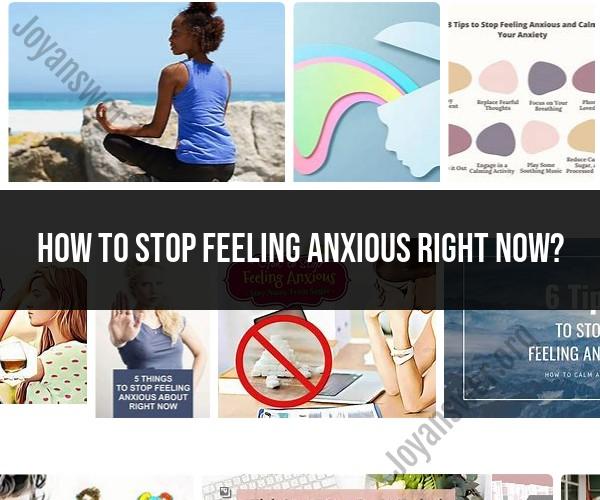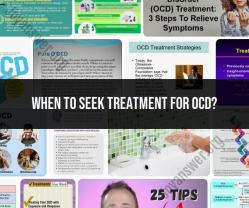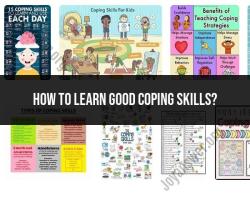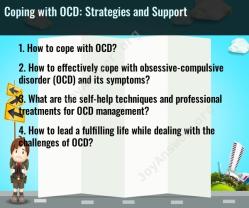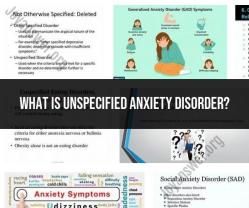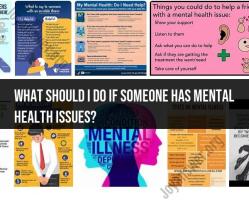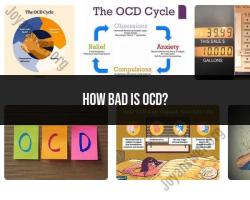How to stop feeling anxious right now?
If you're feeling anxious and need immediate relief, there are several techniques you can try to calm your mind and reduce anxiety. Keep in mind that different techniques work for different people, so you may need to experiment to find what works best for you. Here are some strategies to help you stop feeling anxious right now:
Deep Breathing: Take slow, deep breaths. Inhale deeply through your nose for a count of four, hold your breath for a count of four, and exhale slowly through your mouth for a count of four. Repeat this several times to help calm your nervous system.
Grounding Techniques: Ground yourself in the present moment by focusing on your senses. Notice five things you can see, four things you can touch, three things you can hear, two things you can smell, and one thing you can taste.
Progressive Muscle Relaxation: Tense and then release each muscle group in your body, starting from your toes and working your way up to your head. This can help relieve physical tension associated with anxiety.
Mindfulness Meditation: Practice mindfulness by paying attention to your breath and observing your thoughts without judgment. This can help you become more aware of your anxiety and reduce its grip on you.
Visualization: Close your eyes and imagine a peaceful place or scenario. Visualize yourself there, engaging all your senses. This can help you escape the present moment and find temporary relief.
Exercise: Engage in physical activity, even if it's just a short walk. Exercise releases endorphins, which are natural mood lifters and stress reducers.
Aromatherapy: Inhale calming scents like lavender or chamomile, either through essential oils, scented candles, or herbal teas. These scents can have a soothing effect on your nervous system.
Talk to Someone: Reach out to a friend or family member you trust and share your feelings. Sometimes, talking about what's causing your anxiety can help alleviate it.
Write It Down: Journal your thoughts and feelings. Writing can help you process your emotions and gain perspective on your anxiety triggers.
Limit Stimulants: Avoid caffeine and other stimulants, as they can exacerbate anxiety symptoms.
Listen to Music: Play calming or uplifting music that you enjoy. Music can have a powerful impact on your mood and emotions.
Use Apps and Resources: There are various mobile apps and online resources designed to provide guided relaxation exercises and anxiety relief techniques. Consider trying some of these apps for immediate support.
Seek Professional Help: If your anxiety is severe or persistent, consider reaching out to a mental health professional for support and guidance. They can help you develop long-term strategies for managing anxiety.
Remember that it's normal to experience anxiety from time to time, but if you find that anxiety is interfering with your daily life or becoming overwhelming, don't hesitate to seek professional help. A mental health therapist or counselor can provide you with effective strategies and support tailored to your specific needs.
Immediate Relief: Strategies to Stop Feeling Anxious Right Now
If you are feeling anxious right now, there are a few things you can do to get immediate relief:
- Take deep breaths. Deep breathing is a simple but effective way to calm your body and mind. When you feel anxious, your breathing tends to become shallow and rapid. Taking deep breaths can help to slow down your breathing and bring your body back to a state of balance.
- Focus on the present moment. Anxiety is often caused by worrying about the future or dwelling on the past. Try to focus on the present moment by paying attention to your surroundings and your breath. This can help to take your mind off of your worries and allow you to relax.
- Exercise. Exercise is a great way to reduce stress and anxiety. Even a short walk or some gentle stretching can help to release tension and improve your mood.
- Talk to someone you trust. Talking to someone about your anxiety can help you to feel better and get support. This could be a friend, family member, therapist, or anyone else who you feel comfortable talking to.
Coping with Anxiety in Real Time: Techniques for Quick Relief
Here are a few additional techniques that can help you to cope with anxiety in real time:
- Use a grounding technique. Grounding techniques help to bring you back to the present moment and focus on your surroundings. One simple grounding technique is to name five things you can see, four things you can touch, three things you can hear, two things you can smell, and one thing you can taste. Another grounding technique is to focus on your breath and notice the sensations of your breath entering and leaving your body.
- Challenge your negative thoughts. Anxiety can often lead to negative thoughts about yourself or the situation you are in. When you have a negative thought, ask yourself if it is really true. Is there any evidence to support this thought? If not, try to replace the negative thought with a more realistic and positive one.
- Visualize a calming scene. Visualization can help to relax your mind and body. Close your eyes and imagine a scene that you find calming and peaceful. This could be a beach, a forest, or any other place where you feel safe and relaxed. Focus on the details of the scene, such as the sights, sounds, and smells.
- Use a relaxation technique. There are a number of different relaxation techniques that can help to reduce anxiety. One popular relaxation technique is progressive muscle relaxation. This technique involves tensing and relaxing different muscle groups throughout the body. Another relaxation technique is deep breathing.
Finding Calm Amidst Anxiety: Practical Tips for Immediate Peace
Here are a few additional tips for finding calm amidst anxiety:
- Create a relaxing environment. If possible, find a quiet and comfortable place where you can relax. You may want to dim the lights, play some calming music, or use a diffuser with essential oils.
- Take a break from technology. Technology can be a major source of stress and anxiety. If you are feeling anxious, it may be helpful to take a break from technology and focus on other activities.
- Do something you enjoy. When you are feeling anxious, it can be helpful to do something that you enjoy. This could be reading, listening to music, spending time with loved ones, or anything else that makes you happy.
If you are struggling to cope with anxiety on your own, please reach out to a mental health professional for support.
